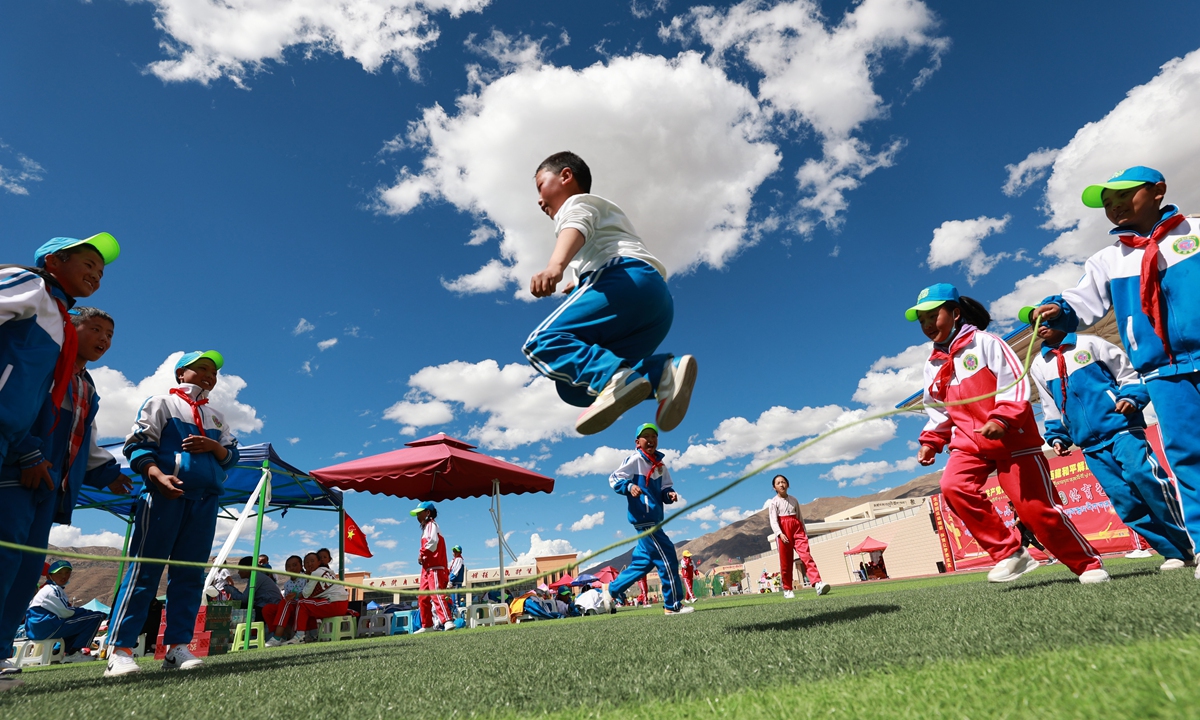Without corroboration or balance, Western media's propaganda targeting Xizang will persuade nobody

Primary school students practice jumping rope in Shannan Prefecture, Xizang Autonomous Region on June 15, 2021. Photo: VCG
After malicious attempts by some Western media outlets to spin lie of "forced labor" in Xinjiang, some Western media are trying to repeat the trick in Xizang (Tibet), first claiming that many children in Xizang have been forcefully sent to boarding school and separated from their families, later the hype of "vocational training programs" for Tibetans.
A few days ago, someone asked for my opinion on education in Xizang. They pointed me to a video released a year ago by CBC, which centered on a Report alleging Tibetans are being stripped of their culture and forced into colonial boarding schools.
The use of three words "colonial boarding schools" was pivotal for shock value. Canadian citizens, just six months earlier, had learnt that thousands of Native Americans were sent to "colonial boarding schools," with many of them dying of neglect. Apart from being misinformation, the timing and wording of this report smack of a massive attempt at projection and atrocity propaganda.
I'm not an expert on Xizang, but I know many people who have. I've met many Tibetans in Guangdong, and on trips to Yunnan and Sichuan many more, and they seem to be doing ok.
I do, however, have knowledge and experience of Chinese education. So, I have a sense of what's normal and what's not in high schools.
When I clicked onto the link and watched this video, my friend was right; what I saw wasn't normal at all. The school was entirely normal; the problem is, the reporting wasn't.
First of all, the host mentioned a report which had been released by the Tibetan Action Institute (TAI), so, I went to TAI's website and found, in a circular reference, they had posted the CBC report. Circular referencing is common in anti-China narratives. One person or organization writes a report, the claims are amplified by a media group with the report cited, and then the claimant presents the media information on their website as fresh news.
Back to CBC's video; while watching, we see a normal Chinese school with normal kids, and the classroom they showed was full of Tibetan language, which seems quite normal, especially in Xizang.
The close-up of a school book is not in Mandarin, the national language of China; it's a Tibetan school book, and clearly a well-used one too.
Something else I saw that was strange was an English freelance reporter, Richard Kimber, commenting on this from Hong Kong. CBS, the Canadian national broadcaster, cannot be forgiven for not providing balance.
Back to Tibet. I personally know several people who have visited Xizang, been to schools and made videos of their experiences. Two Americans were there just a few months ago and recorded not just their amazement at the infrastructure but their shock at the changes and how they were allowed to stop the car and visit any place or talk with any person they wanted. Another friend of mine, Daniel Dumbrill, went there two years ago and reported much the same thing, including asking a student to explain a science experiment in Tibetan, which, of course, she did.
Tibetan schools, as anyone who visits them knows, are full of Tibetan people surrounded by Tibetan culture; even the negative portrayal by CBC showed Tibetan culture and surprisingly, even Han students must learn Tibetan.
One point of the video which anyone in China would find hard to accept is the claim that Tibetan kids are forced into boarding schools. Many Chinese kids go to boarding schools, and anyone who knows anything about the culture of China would know the number in some regional areas is high. Xizang is a vast region of 1.2 million square kilometers, more than three times bigger than Germany. But the population of Tibet is just 3.6 million people, compared to Germany's 84 million, which is 4.5 times higher. So, distance makes boarding schools necessary.
The report states that as many as 800,000 students attend these schools but admits the number is arrived at by estimates and extrapolation. If that seems familiar to readers, it is exactly the same number as another extrapolation by an academic; 800,000 Uygurs were alleged to have been in re-educational centers in Xinjiang.
Some other things a researcher might have found, had they looked a little closer, is that all school costs in Xizang: uniform; books; accommodation; tutoring and transportation are free and have been since 1985. Financial incentives are provided to impoverished families to encourage kids to attend. Literacy in the region has risen from 5 percent in 1951 to 99.5 percent in 2015. There are benefits to compulsory education rather than enforced serfdom.
The disappointing aspect of this is that, the report's creators, like most Tibetans in exile, are the children of people who left 70 or more years ago. Their parents' experiences have been passed down through the generation(s). Unfortunately, the flames of their animosity have been kindled and kept alight by 70 years of financing from a country that admits it uses Tibetans as a tool against China.
Rather than return to Xizang to experience reality, Tibetans in exile are encouraged to believe stories, and they are used for political purposes. It's not shocking that a Tibetan group created this report.
What is shocking is that a Canadian media outlet was used to project what was done historically in their country onto China without corroboration or balance. No reference was made to any person in Xizang, no Tibetan teachers or students and not even a foreigner with experience in Xizang, all of whom would have shot this "atrocity propaganda balloon" down in a moment.
The author is a British Australian freelance writer who has studied cross cultural change management in China and has lived in the country, traveling extensively for almost two decades. opinion@globaltimes.com.cn
